
Photo: RNZ
Promises, promises: it’s easy to forget which party has pledged what. Welcome to RNZ’s go-to guide for party policy ahead of the 14 October election day. We’ll keep updating this guide as policies are rolled out - but some may be delayed, or too vague to be worth mentioning.
First published 3.30pm 22 August, last updated 3.36pm 12 October.
Economy and tax
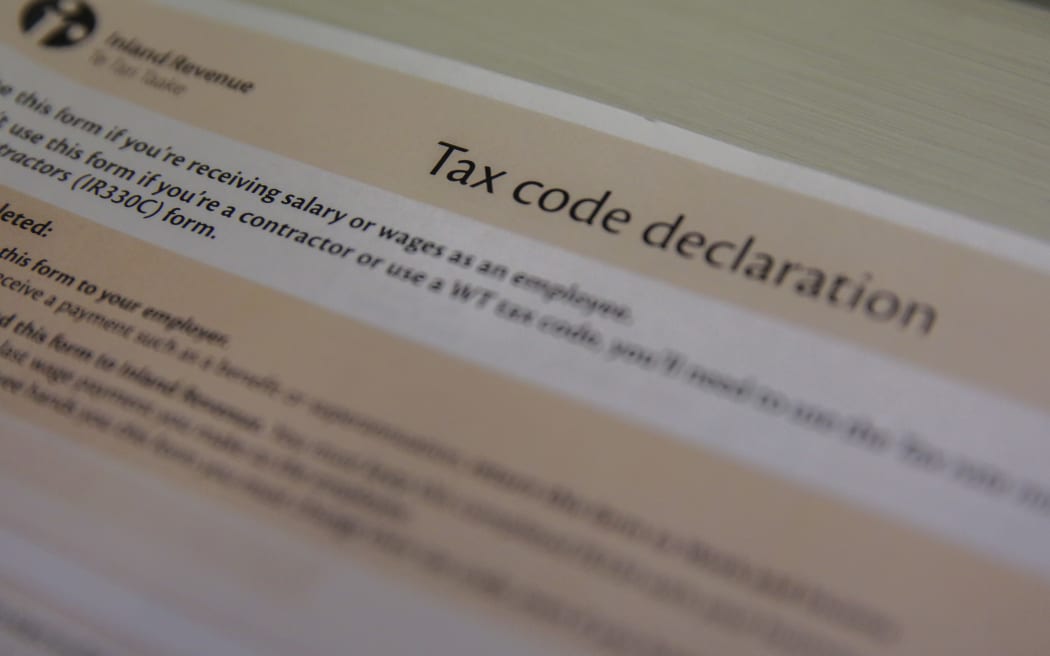
Photo: RNZ / Richard Tindiller
Labour: Scrap GST from unprocessed fruit and veges, and increase the Working for Families (WFF) in-work tax credit by $25 (policy here). Invest $100m in agritech through the Venture Capital Fund, Prime Ministerial visit to India within 100 days of a new government (policy here). Leader Chris Hipkins also ruled out a wealth or capital gains tax. Set up anti-scamming unit.
National: Tax cuts, WFF in-work tax credit increased by $25, increased eligibility for Independent Earner Tax Credit and FamilyBoost (see Welfare and family section) paid for with public sector cuts, new taxes on foreign property buyers and offshore online gambling, user-pays immigration levies, and Emissions Trading Scheme funds. Reverse Labour's public transport subsidies and 20 hours free ECE for two-year-olds, the Auckland regional fuel tax, 10-year bright line extension back to 2 years, the Clean Car Discount (or 'Ute tax'), the 'app tax' which imposed GST on ridesharing and accommodation services like Uber and Airbnb, the Reserve Bank's employment mandate, the Income Insurance Scheme (now put on hold by Labour) and Fair Pay agreements. Phase in interest deductibility on rentals (policy here). Earlier plans to scrap the $180,000+ top tax bracket have been abandoned. Reinstate 90-day trials. Prime Ministerial visit to India within a year.
ACT: Shift to a three-tier income bracket tax system with a tax credit for low and middle incomes, reduce company, trust and top income taxes to 28%, cut public servant numbers and departments, abolish bright line test entirely, restore interest deductibility on rentals, reverse Labour's public transport subsidies, raise superannuation age to 67 and halt government contributions, sell up to 49% from state-owned enterprises and 100% of Landcorp. Scrap the following: Income Insurance, healthy school lunch programme, winter energy payment for those without community services card, fees free, climate emergency response fund spending, EECA, Climate Change Commission, Climate Change CEOs board, industrial energy efficiency and fuel switching, forestry programme, clean car discount, Kiwisaver subsidies, free prescriptions, provincial growth fund, Progressive Home Ownership Scheme and the First Home Grant, R&D grants, Callaghan Innovation, R&D tax credit, growth and development spending, new market ops spending, film subsidies, industry transformation plans, workforce development councils, 'demographic' ministries for women, Pacific peoples, Māori development, ethnic communities, Crown-Māori relations, the Human Rights Commission (policy here). Abolish all remaining import tariffs. Set a target of being in the top 10 OECD countries for GDP growth (policy here). Freeze the minimum wage for three years and remove the 2 January holiday to make up for introduction of Matariki, make anti-money laundering regulations easier to comply with (policy here).
Green: $385/week "income guarantee" for anyone out of work plus $135 for sole parents to replace Jobseeker, Student Allowance and Sole Parent Support, a $10k tax-free bracket, a 2.5% tax on net wealth above $2m, change Working for Families to $215/week for first child and $135 subsequent children (policy here). Minimum wage in line with inflation, right to redundancy, default union membership, right to solidarity and political strikes, increase WorkSafe, ERA and labour inspectorate funding, five weeks annual leave, support a capital gains tax, new bereavement leave entitlements appropriate to tangihanga (policy here).
Te Pāti Māori: Suite of tax changes with $30k tax-free bracket, change brackets in favour of lower earnings, remove GST from all food, introduce wealth, foreign companies, land banking and vacant house taxes, increase company tax rate to former 33% rate (policy here).
NZ First: Select committee to investigate GST off "basic foods" (previously remove GST off basic foods), adjust tax brackets for inflation, introduce tax incentives to promote added value, tax-free income bracket for the first $14,000 of earnings by April 2027, reinstate tax deductability "starting 1 April 2024, with the first adjustment taking place in 2027", pay down debt by setting max government expenses at $165bn and max core government expenses at $133bn, examine tax concessions for businesses with a minimum wage of at least $25 an hour, force supermarkets to divest distribution centres and coolstores, UK-style consumer duties for banks, create a financial services ombudsman, select committee inquiry on a 20% exporters tax, independent review of NZ Trade and Enterprise, expand NZ Export Credit Office and lessen the costs for exporters, Budget surplus in 2024/25, a 40% refundable tax offset for games developers spending $600,000+, fully restore 90-day trials, enable the Ombudsman to investigate whether consultancies are genuine, Select Committee Inquiry into sharing GST from rates with councils, expand NZ-owned registered banks with a Crown guarantee to ensuring government banking could be done by NZ-owned bank, prohibit any NZ-registered bank from "discriminating against, or debanking, businesses or individuals on the basis of business type or political belief", increase penalties for tax evasion, select committee review into double taxation e.g. GST on rates and excise tax, 100 percent depreciation rate for business equipment, redefine small to medium enterprise businesses from 19 employees to 50 FTE staff, investigate feasibility of a "digital CV scheme".
Crime and justice
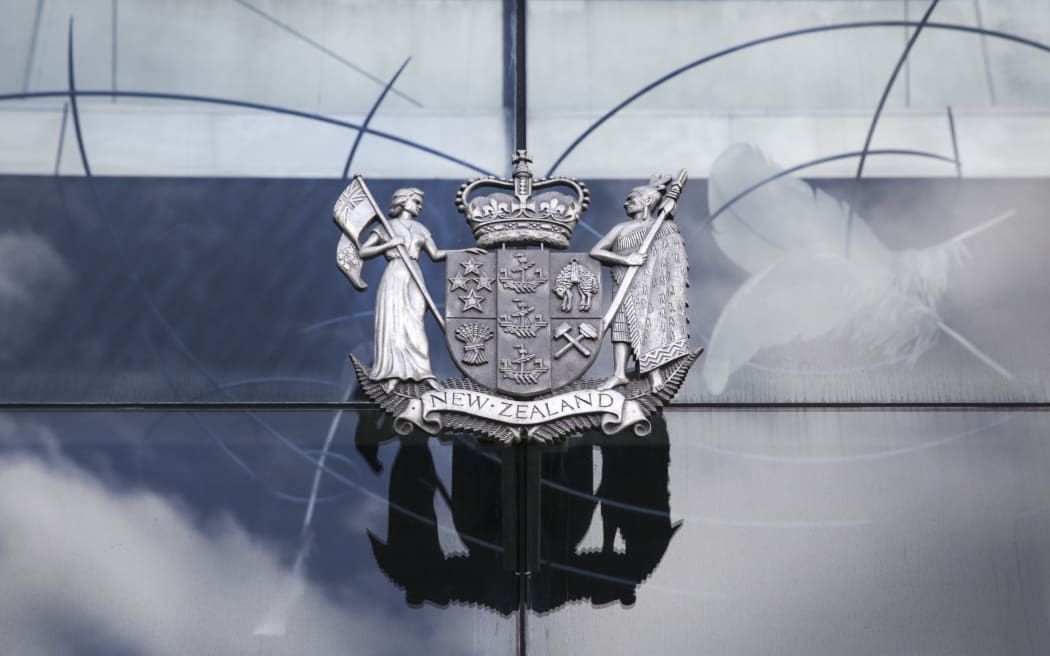
Photo: RNZ / Rebekah Parsons-King
Labour: Expand the 'circuit breaker' fast-track intervention programme, build two new youth justice facilities, new offence to target ram raiding and allow ages 12/13 to be charged in youth court for ram raiding, increase sentences for criminals who use or reward children for committing crime, posting offending behaviour online would be aggravating factor, create a new intensive long-term programme for the most prolific young offenders. Add 300 new frontline police officers over four years, a five-year rollout enabling mental health professionals to attend callouts (policy here). Establish a formal class actions regime, "modernise" consent law, review legislative settings for District Court jury trials, expand use of audio-visual tech in courts, pass legislation to address name suppression settings, litigation abuse, and questioning children about consent (policy here). More police than gang members.
National: Restore three strikes, limit sentence reductions to 40% of maximum, make gang membership an aggravating factor, end taxpayer funding for cultural reports, and extend rehab programmes to remand prisoners (policy here). Ban gang gatherings, patches and insignia in public, allow police to stop known gang offenders communicating for up to three years (policy here). Expand FPOs to give police no-warrant search and seize powers, give COLFO a role in developing firearms policy, review the Arms Act with responsibility shifting to the Ministry of Justice (policy here). Introduce a Young Serious Offender category for ages 10-17, set up military academies for YSOs age 15-17, invest in community organisations to tackle youth crime (policy here). Add 300 frontline police over four years (policy here). More police than gang members. Anti-gang policies to be passed within 100 days.
ACT: Add 524 prison beds each year, reduce spending on community sentences, give Corrections oversight of youth justice, increase youth justice beds by 200, lower the youth justice age to 17. (policy here). Make violence against workers an aggravating factor (policy here). Gang control orders, increase firearms seizure powers, use IRD to investigate gang income, introduce shoplifting infringement notices, ankle bracelets for serious young offenders, review electronic monitoring, redirect proceeds of crime to victims, reinstate three strikes with added burglary offence, require literacy standards for parole, tag Police budget to population (policy here). Repeal six elements of the Arms Legislation Act 2020, replace the Arms Act 1983 (policy here).
Green: Fund rehabilitation for all convicts and offer tikanga and restorative justice options, roll out Rangatahi and Pasifika specialist youth courts across NZ, fund mental health and drug rehabilitation for young offenders, require regular de-escalation training for police, minimise remand in youth detention, more funding for legal aid and community law, implement the mosque attack inquiry recommendations (policy here).
Te Pāti Māori: Set up a Māori Justice Authority and parallel Māori justice system based on tikanga and self-governance, by reallocating half the budget from Corrections, Police and Courts, with the aim of abolishing prisons in Aotearoa by 2040; shut down youth justice residences, adopt all Waitangi Tribunal justice recommendations, repeal Bail Amendment Act, raise age of criminal responsibility to 16, wipe drug use/possession convictions, require police body cameras, bring in "judgement proof debtor policy", replace IPCA with list of barristers with same powers, increase steps to freedom payment to $1000, reinstate voting rights for all prisoners, expand mental health co-response teams, increase funding for addiction/substance services (policy here).
NZ First: Make gang membership an aggravating factor, add a six-month mandatory minimum sentence for assaulting first responders, designate gangs as "terrorist entities", set up a dedicated gang prison, add at least 500 new frontline police officers, double the number of youth aid officers, review police pay/conditions to reduce attrition, "adequately resource" community policing like Māori and Pacific wardens and neighbourhood watch, introduce a youth justice demerit point system, review fleeing driver legislation and bring in harsher fleeing driver penalties, prioritise the victim and community over offenders in the Sentencing Act, bring in policies to maximise driver licencing in secondary schools and for prisoners, fund tattoo removal for rehabilitated gang members in prison but demand payment if they get more gang tattoos, introduce 'degrees of murder' regime with 'life-for-life' for 1st degree, remove community sentences and discounts for violent offenders considered a threat to the community, "implement prisoner-constructed prison portability units policy' so that the costs of labour on such construction will be removed from the taxpayer to the prisoners themselves", enforce a "dangerous littering" law, increase fines for low-level crimes like texting while driving and shoplifting, expand on non-custody penalties like property confiscation, reparations, payments and fines, remove concurrent sentences for offences on parole, bail or in custody, investigate funding for body cameras and protective equipment funding for Corrections officers, replace 'prison officer' or 'prison guard' in legislation with 'Corrections officer', mandatory minimum cumulative sentences assaulting Corrections officers, mental health response units, establish an independent firearms authority, put prisoners to work on schemes like Jobs for Nature.
Energy, climate and environment

Photo: bbc.co.uk
Labour: A new Minister for Just Transitions, "12-point plan" to increase renewables generation, center of excellence for renewable energy, bring Green Fund investment up to $1b (adding $300m), invest $70m into emissions reduction R&D, remove diesel generators from all schools, a cap on forestry in the ETS, give the Climate Commission power to set ETS, offshore wind within a year, expand ETS removal categories to include peatland and wetland restoration, $30m to plan native trees on DOC land, develop regulations for carbon capture and storage, a new National Policy Statement for Renewable Electricity and Transmission within first 100 days, EV charging hubs every 150-200km on main highways, support for low-emissions trucks, farm-level emissions pricing by 2025 (policy here). Rebates of $2000 for solar panels on homes, plus $2000 for a battery, a $20m community energy fund, install solar panels on 1000 Kāinga Ora homes each year (policy here). Ban bottom-trawling in most of Hauraki Gulf, and six new marine reserves in South Island. Add feral cats as a pest to the Predator-Free 2050 strategy.
National: Support the rollout of 10,000 EV chargers by 2030, make EV charger installation a permitted activity under the RMA, scrap the clean car discount (policy here). One-year time limit for consent decisions on solar, wind and geothermal generation, eliminate consents for upgrades to existing infrastructure and most new infrastructure with the aim of doubling renewables with offshore wind permits within a year. Put ETS funds into general expenditure. Introduce farm-level emissions pricing by 2030 by setting up an independent Agricultural Emissions Pricing Board. Establish a minister for hunting and fishing, designate herds of special interest, change the law so game animals are not pests, guarantee access to public land for hunting and fishing, protect trout and salmon fishing (policy here). Set up a cyclone and flood response ombudsman, cut regulations and prioritise four highways linking cyclone-affected regions, require EQC to prioritise land value assessments (policy here). Add feral cats as a pest to the Predator-Free 2050 strategy.
ACT: Reverse the ban on oil and gas exploration, replace Te Mana o te Wai in consenting with direct freshwater allocations for hapū who can show customary rights, end the Lake Onslow project scoping work, cut regulations for underground carbon storage technology, fast-track offshore wind permits (policy here). Replace the RMA with property-rights based law, with fast-tracking for all projects (policy here). Refund ETS to New Zealanders with a carbon dividend. Exempt OECD countries from Overseas Investment Act. Cut MPs' flights by 25 percent, tie carbon prices to trading partners', remove regulations favouring landfills over waste reduction, end council consents for dumping sewage into rivers, develop a national environment management monitoring system (policy here).
Green: Payments up to $6k and $30k interest-free loans for homeowners to install solar or efficiency upgrades, and make tax-deductable carbon-zero upgrades (policy here). A $750m climate resilience fund for nature restoration in towns and cities to curb flooding risk (policy here). Set a legally binding target of 30 percent protection of New Zealand's ocean territory, set up a $100m fund to support iwi and hapū to deliver on marine conservation, lobby for a Green Party minister of Oceans and Fisheries, replace marine protection laws with Tiriti-based legislation using a new Ocean Commission's recommendations, ban seabed mining in EEZ, phase out bottom trawling on seamounts, set netting and dredging, establish Hauraki Gulf protected areas, set fishing mortality limits, roll out fishing cameras (policy here). Allow the Climate Change Commission to directly set ETS unit supply, require all government policies and targets to align with 1.5C of warming, support whānau, hapū, iwi and Māori businesses to develop adaptation plans, agricultural emissions pricing including methane with reinvestment in on-farm emissions reduction, citizens' assemblies to recommend climate adaptation plans, phase out dependence on fossil fuels and growth, provide regular accountability statements (policy here). Legal protections for indigenous plants and wildlife, at least 5% of land area as native vegetation, establish a linked network of land, marine and aquatic areas under protective management (policy here). Ban new fossil fuel extraction, fund solar panels on public buildings, require transparent energy wholesaling, reinvest government energy dividends into renewables, transition away from gas power, prohibit new home gas connections (policy here). Enshrine the right to a healthy environment in law, replace the Environmental Reporting Act, increase funding for the Environmental Protection Authority, legally require remediation of environmental harm (policy here). Implement Te Mana o te Wai water management principles, fund protection of wetlands, fund councils to restore floodplains and braided rivers, strengthen nitrogen regulation, restore degraded waterways and control freshwater pests, create a "fair" system for commercial water allocation (policy here). Set up a Zero Waste Agency, right to repair, beverage container return scheme, product stewardship schemes, increased landfill levies, recyclables and compostables labelling standards, construction waste reduction standards (policy here).
Te Pāti Māori: End all oil and gas permits within five years, ban seabed mining, end mining on conservation land, set up $1b fund for Māori-owned community energy projects, codesign a national Māori strategy for renewables and clean tech, phase out synthetic nitrogen by 2025, bring agriculture methane into ETS, establish $300m fund to support Māori farmer transition to regenerative farming, ban coal mine permits and phase out industrial coal by 2030, incentivise transition away from intensive dairying (policy here). Overturn the Crown's "everyone owns water" policy, acknowledge Māori proprietary, customary and decision-making rights over freshwater, acknowledge freshwater whakapapa rights in law, substantial increase to Te Mana o te Wai funding, moratorium on new water bottling plants until allocations system developed, include Māori rights and interests in water in including discharge decisions in consenting process reform (policy here).
NZ First:Not support emissions pricing in any form but adopt standardised farm-level reporting, develop science as a response to climate change, energy generators required to divest retail, allow local lines companies into generation, abolish the Electricity Authority, investigate reopening Marsden Point Oil Refinery, set up a Ministry of Energy, repeal the Crown Minerals (Petroleum) Amendment Act 2018, and actively investigate the potential of former coal mines and white hydrogen, only limit fishing in places where there is evidence it will cause damage "to outstanding biodiversity and/or critical habitats", increase offshore inspection capacity for biodiversity pests, exempt aquaculture from the 2010 NZ Coastal Policy Statement, prioritise research funding towards kelp growing as a possible contribution to net zero emissions, address pollution of streams, rivers, and beaches as an absolute priority, halt creation of any new landfills, develop a national waste-to-energy strategy, ensure developers are responsible for avoiding, remedying and mitigating negative environmental effects, set up an NZ Native seed bank, fund the kauri dieback response, support research into 1080 alternatives, expand pest trapping zones, survey all stewardship land and remove "lands that should not be so designated", invest $100m into transmission upgrades, support a waste-to-energy plant in Northland to replace Dome Valley tip, oppose any closure of Tiwai Point aluminium smelter, exempt aquaculture from the Coastal Policy Statement to allow the Stewart Island Salmon Farm to proceed. Establish a Ministry for Energy and a Fuel Security Plan, repurpose money from the ETS and purchase of overseas credits to mitigations including low-methane genetics, (previous policy to repeal the National Policy Statement on indigenous biodiversity removed).
Health and disability

Photo: RNZ / Samuel Rillstone
Labour: Fund free dental care for under-24s from 2025, and under-30s by 2026 and increase dental course caps by 50% (policy here). Increase doctors places by 95 a year in 2025, increasing to an extra 335 a year by 2027 at a cost of $1b over 10 years (policy here). Licence all vape retailers and reduce their number to 600, increase penalties for selling vapes to children from $5k to $10k (and from $10k to $15k for retailers), ban vape advertising and sponsorships, and ban vape products from storefronts (policy here). Increase Pharmac funding by $1b within four years (policy here). Progressively extend living wage to education and health workers, reduce the gap between minimum and living wage, scrap starting out and training wages, protect collective bargaining and fair pay agreements, continue to restrict 90-day trials (policy here). Raise breast cancer screening age from 69 to 74, national endometriosis action plan, make cervical screening screening free between age 25-69, establish an innovation and entrepreneurship scholarship programme for low-middle income women, "modernise" consent law, introduce gender pay gap reporting (policy here). Build a new hospital for Hawke's Bay with business case beginning in first 100 days of government (policy here). Equalise pay for hospital and GP clinic nurses and lower the bowel cancer screening age.
National: Bring in five health targets and pay GP clinics a $10-per patient incentive for immunisations (policy here). Set up a third medical school at Waikato University (policy here). Ringfence $70m a year for Pharmac cancer treatments, paid for by reimposing $5 prescriptions for all but superannuitants and those on low incomes, extend free breast cancer screening to 74 years of age (policy here).Nurse bonding scheme to fund $4500 a year for first five years of nurse and midwife student loans if they remain in NZ, an automatic six-month temporary visa for qualified overseas nurses and midwives and their family without needing a job, offering $10,000 grants to up to 1000 overseas nurses and midwives a year. (policy here). Equalise pay for hospital and GP clinic nurses and lower the bowel cancer screening age to match that of Australia. A limit of 600 on the number of vape stores nationwide, and if that doesn't work then try making them prescription-only. Allocate $19m a year for extending after-birth hospital stays from two days to three, $5.2m a year for free glucose monitors for under-18s with type-1 diabetes, increase psychiatric registrar places to 50 a year over four years, and clinical psychologist places to 40 (policy here).
ACT: An independent review of Pharmac, public subsidies for common elective surgeries in private hospitals, work with the Medical Council, College of General Practitioners and Medical Schools on more efficient qualification evaluation for migrants, public-private partnerships (PPPs) for hospital buildings with long-term lease-backs (policy here). Redirect $2b a year from the Ministry of Health and Te Whatu Ora to the Mental Health and Wellbeing Commission to be a centralised commissioning agency (policy here). Set up a tribunal to assess overseas qualifications, allow the Health Minister to override regulatory authorities, expand physician assistant roles to support GPs, embed "intelligent forecasting" into workforce modelling (policy here). Reopen the terms of reference for the Covid-19 Royal Commission of Inquiry, giving six weeks for New Zealanders to give feedback (policy here). Require Medsafe to approve any medicines or medical devices within a week if at least two similar countries have done so, require the Ministry of Health to publish a three-yearly Medicines Strategy, require performance benchmarking for Pharmac (policy here).
Green: Free dental care for all (policy here). Review ACC, extend cover to non-accidental and mental injuries, change funding to pay-as-you-go with levies on employers and employees and add risk-based levies, ban ACC investment into harmful products/services (policy here). Double disability allowance, co-design accessibility legislation, require new housing accessible under building code, require accessibility on TV, eliminate use of seclusion (policy here). Treat substance addiction as a health problem, regulate personal use of cannabis, phase out alcohol advertising and sport sponsorship, regulate vaping products to minimise new users, roll out overdose prevention services (policy here). Increase Pharmac funding, create Healthy Air ventilation standards and fund retrofits to meet them, target bias in the health system (policy here). Implement Every Life Matters strategy, universal free mental health services, improve ADHD, autism, dyslexia and dyspraxia, and eating disorder services.
Te Pāti Māori: Divert a quarter of all heath funding to Te Aka Whai Ora (Māori Health Authority), free primary care, dental and medication deliveries for families earning under $60k, bring in a Māori health card to ensure funding is linked to the patient not the service, invest $1b a year on health workforce development, protect mātauranga Māori models of health, establish a kaupapa Māori mental health service, drop Māori cancer screening by 10 years, increase Pharmac funding, establish a Māori ACC (policy here). Establish a National Māori Sporting body, establish a $100m-over-three-years fund for by-Māori, for-Māori sporting codes separate from regional sports bodies, ensure codes with high Māori participation have Māori governing boards, set up a Māori sports mentorship programme (policy here). Immediately abolish the minimum wage exemption for Tangata Hauā, establish a Mana Hauā Authority with a quarter of all disability funding, establish kaupapa Māori disability organisations, abolish ACC and establish a Māori ACC, require consultation with Māori disability groups in all related policy and legislation, require all new homes to be fully accessible under building standards, remove barriers to healthcare for Tangata Hauā, ensure antenatal screening is not biased towards termination of pregnancy if a disability is diagnosed, recognise Te Reo Rotarota (sign) as an official language, require te reo Māori proficiency to be assessed in NZ Sign Language qualifications, provide pathways for te reo Māori speakers to learn Te Reo Rotarota and NZSL, abolish abatement rates on benefits for Tangata Hauā and their careworkers (policy here).
NZ First: Make $925m available each year to a GP-controlled waitlist reduction fund to "buy specialist appointments and operations", amend the Health Practitioners Competence Assurance Act to fast-track registered doctors into general practice, adopt digital health clinics led by nurse practitioners, "acquire the latest in diagnostic technology" to "ensure a diagnosis is available in hours not days" (not clear which technology would be aquired, how much this would cost, or how it would achieve the shorter timeframe), in-demand clinical staff trained and registered in Australia, Canada, Singapore, Ireland, the US and the UK eligible for residence within 30 days and Permanent Residence within two years if they commit to eight years of work in NZ, repeal the Therapeutic Products Act, automatic approval of any medicine approved by two peer regulators, $10m over three years for Mike King Gumboot Friday charity, reinstate Workbridge as an employment agency for Kiwis "who are differently abled", end vaccine mandates, meet St John Ambulance funding demands, ensure "proper" funding for Plunket, rescue helicopters, and Surf Lifesaving NZ, increase Pharmac funding, "sort Pharmac out" to focus on performance.
Education

Photo: RNZ/ Nick Monro
Labour: Make the apprenticeship boost scheme permanent; 20 hours free early childhood education for ages 2+. Make financial literacy education mandatory, make reading, writing and maths teaching consistent with mandatory Common Practice Model. Extend the ban on sugary drinks to secondary schools. Continue funding free school lunches at current settings. A $43m fund to support young people into education and training, funding for 2,000,000 hours of Covid-19 maths and literacy catch-up (policy here).
National: Require one hour per day on average on each of reading, writing and maths at primary and intermediate schools, rewrite the primary-intermediate curriculum, require standardised testing twice a year for Year 3 to Year 8, introduce a reading, writing, maths and science exit exam for teacher graduates, develop an online resource bank for lesson plans, scrap teacher registration fees, commit to getting 80 percent of Year 8 students at or above curriculum level by 2030, get NZ in top 10 of PISA rankings by 2033 (policy here). Ban cell phones in schools (policy here). Require primary schools to use "structured literacy" approach to learning to read, with phonics checks for Year 2s, and interventions for those who need more support (policy here). Expand work rights for international students and their partners, increase work eligibility for international students to 24 hours a week, fast-track visa processing for international students who pay a fee, target more countries for international education (policy here). Continue funding free school lunches at current settings but look to make it more efficient. Previous plans to abolish fees-free tertiary have been abandoned.
ACT: Mandatory daily national attendance reporting with a traffic light system for absences; weight truancy services' funding by Equity Index for individual schools; fines for parents of truant children (policy here). Establish a $250 million a year Teaching Excellence Reward Fund, reinstate charter/Partnership schools, set up an individual fund for tertiary study for all children, halve staffing at the Ministry of Education (policy here). Introduce stronger ERO evaluations, allow successful school boards to take over management of schools that fail, twice-a-year standardised testing at primary, online league tables, allow multiple curriculums, bring in extra mock exams, replace current NCEA with University Entrance, expand employer and tertiary input into NCEA standards, increase unannounced ERO visits to ECE, expand B4 School health checks for age 4s to include basic education skills and cut funding for ECEs that fail these (policy here and here). Scrap free school lunches (see economy and tax).
Green: Work towards universal free public ECE, improve staff-student ratios at all school levels, fund universal teaching of te reo Māori and tikanga Māori in public schools, create on-site school health, mental health and social service hubs, expand free lunches in schools to 365,000, ban class streaming (policy here). Universal $385 a week student support, living wage work placements, expand free apprenticeship scheme, return to default student union membership (policy here).
Te Pāti Māori: Double funding for Te Mātāwai (Māori Language Commission), remunerate teachers based on reo Māori competency, offer reo Māori and Māori history as core curriculum subjects up to Year 10, invest $40m in teacher reo Māori training, require schools to incorporate te reo into 25% of curriculum by 2026 and 50% by 2030, invest $20m on reo Māori resources, require state funded broadcasters to have basic reo Māori fluency (policy here). Universal doubled student allowance, free public transport for all students at all levels. Ensure Māori-medium education is funded equal to mainstream, set up a $200m fund for whānau, hapū and iwi education initiatives, ringfence a quarter of education budget for Māori education models, fund free digital services for Years 4 to 13, end expulsions for under-16s, mandate Māori in school senior staffs, a $276m fund for STEM and STEAM academies, double Māori and Pacific trades training, remove apprenticeship fees (policy here).
NZ First: Remove "gender ideology" from the curriculum, change fees free from first year to third year, contingent on passing all courses, wipe in-demand critical workers' student loans by one year's worth for every two years in full time work, make apprenticeships boost permanent, return to a Targeted Trade and Apprenticeship Fund, a universal student allowance, more funding and professional development for librarians, establish a fund for research into early childhood education, remove student loan repayments for current students earning under the median wage and change the mandatory repayment rate to 10 percent of income to ease burden of debt.
Transport and infrastructure

Photo: RNZ / Marika Khabazi
Labour: Auckland light rail and Let's Get Wellington Moving, but likely with changes to both. Three tunnels across Waitematā harbour with two for vehicles and one for light rail. Prioritise 14 projects with $20b, plus a boost to road maintenance with a 4c increase to fuel taxes each year from late 2024. Continue with the Three Waters/Affordable Water and RMA replacement programmes.
National: A $24.8b spend over 10 years on 13 roads of national significance, public transport projects in Auckland and the lower North Island, and a range of resilience upgrades (policy here). A $500m fund to repair potholes within 24 hours including on local roads. Infrastructure would be planned for by a new National Infrastructure Agency with a 30-year investment pipeline making use of PPPs, value capture (like road tolling), fast-track consenting (policy here). Scrap the Three Waters entities within 100 days, restoring council control with requirements to ringfence water funding (policy here). End speed limit restrictions - restoring 80km/h zones to 100km/h, and 30km/h local roads to 50km/h, and increase some highways to 110km/h (policy here).
ACT: PPPs including toll roads, under 30-year infrastructure plans, add tolls to some existing roads and building towards satellite-based tolling (policy here). Scrap three waters, instead allowing voluntary shared-services agreements and PPPs (policy here).
Green: Light rail in Auckland and Wellington, nationwide rapid rail between major cities, e-bike community hire schemes through marae and community centres, fares-free for students/apprentices, under-18s and Total Mobility card, allow direct public transport provision by regional councils (policy here).
Te Pāti Māori: NYA
NZ First: Collaborate with local council to develop Dargaville Aerodrome, move Ports of Auckland operations to Northport and establish a drydock and naval base in the area, connect Marsden Pt and Northport to Northern main trunk rail line, a four-lane highway alternative for the Brynderwyns, no money spent on light rail or cycle lanes until there are no potholes, establish an NZ Infrastructure Bank, new Ministry of Infrastructure, develop a logistics, transport and land use national supply chain and freight strategy, rename Waka Kotahi to NZ Transport Agency, put Road to Zero funding towards increasing regional road speeds from 100km/h to 110km/h, heavy rail from Puhinui station to the airport, scrap Auckland light rail and Let's get Wellington Moving, expand the merchant fleet, rebuild the inshore fishing vessel fleet through government-backed loans for owner-operator vessels up to 24m built in NZ, expand use of electric and hydrogen fuel cell vehicles, "no roads to be privatised or corporatised", select committee inquiry on road tolls instead of fuel excise, support "quality affordable public transport", investigate reopening the Wairoa to Gisborne rail line, build Marsden spur linking Northport to Northland rail line, fully rebuild and improve Christchurch-Picton rail corridor, (Also see farming and forestry section).
Housing
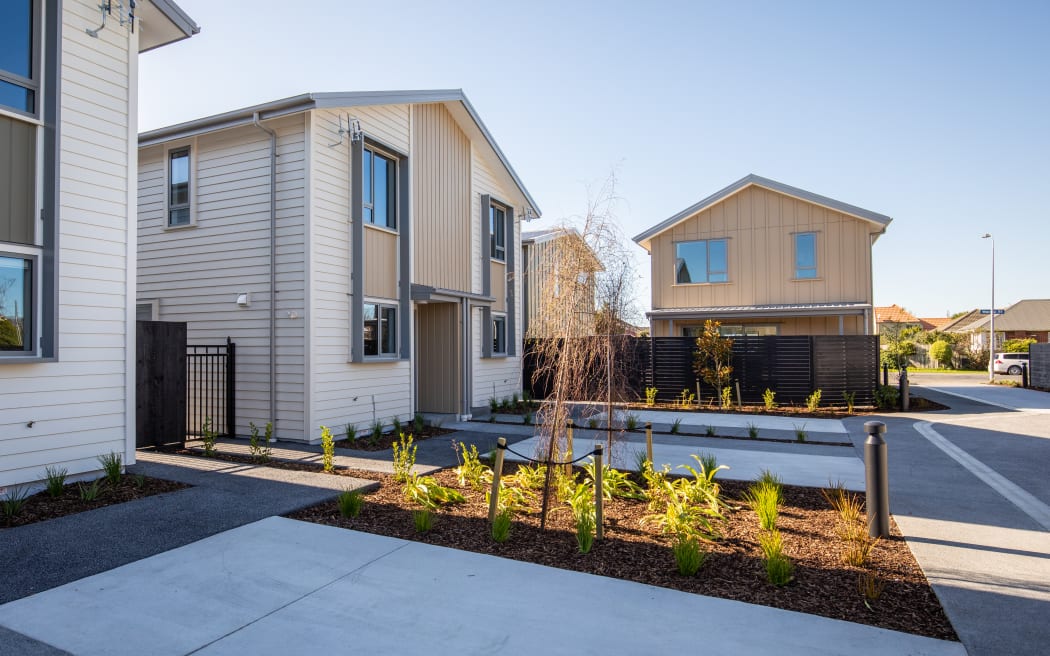
Photo: RNZ / Nate McKinnon
Labour: Provide a rebate of up to 30 percent - capped at $18k - for deep retrofit of homes, with up to $7000 for partial retrofits and up to $3000 for switching from gas connections to electric (policy here). Build an extra 6000 state houses by 2027 on top of current track (policy here). Build 1000 state houses a year in Auckland.
National: Allow councils to opt out of the medium-density law, housing growth becomes a transport funding priority, a new $1b fund to incentivise councils to deliver housing (policy here). Build 1000 state houses a year in Auckland. End the use of emergency housing in Rotorua within two years by increasing social housing places (in line with Labour's forecast), prioritising long-term stayers, tightening eligibility criteria for the hotels, and review Kāinga Ora (policy here). Allow under-30s to use KiwiSaver to pay for rental bonds. Change the Overseas Investment Act and Income Tax Act to encourage build-to-rent developments (policy here). Bring back no-cause terminations for renters.
ACT: Allow builders to opt out of council building consents, using insurance and codes of practice as an alternative to building consent authorities (policy here). Share half of GST revenue with councils that build new housing; implement a building materials equivalence register; replace existing building regulations with compulsory 30-year building insurance (policy here). Amend the Residential Tenancies Act so landlords can evict tenants after two written notices within a year, rather than three within 90 days, return tenants' notice period to 21 days (currently 28) and landlords' to 42 (currently 90) if they want to move or sell, allow landlords to charge an additional pet bond, allow Kāinga Ora to terminate a tenancy rather than being transferred and this would only require a service unit manager's sign-off rather than chief executive and deputy, give landlords the power to dispose of goods left in a tenancy after two weeks, make it so Kāinga Ora tenants evicted for antisocial behaviour are moved to the bottom of public and emergency housing waitlists, allow testimony from neighbouring residents to act as proof of anti-social behaviour at Tenancy Tribunal, apply Residential Tenancies Act section 53B to all tenancies rather than just periodic ones, reduce tenancy termination notice period from 90 to 21 days, scrap the "sustainable tenancies" policy, set a policy requiring Kāinga Ora to engage police if they're made aware of illegal activity, require Kāinga Ora to process and consider all public complaints and inform complainants of its decision (policies here, and here).
Green: Limit annual rent increases to 3 percent and link new tenancies to previous, create rental WOFs system, scale up Kāinga Ora and Māori-led housing, expand on shared equity, progressive home ownership and low-interest government loan schemes, government underwrites of community housing, and government mortgage refinancing for new homeowners at risk of hardship, development bonuses for tall, energy-efficient and accessible buildings, a value-uplift levy on land near public transport hubs, protections for urban trees and greenbelts (policy here). Build 35,000 new warm, affordable homes over the next five years . Build 1000 state houses a year in Auckland.
Te Pāti Māori: Build 2000 houses on ancestral lands within two years, ensure 50% of new social housing is allocated to Māori, end freehold land sales to foreigners, apply Overseas Investment Act to residential housing purchases (policy here).
NZ First: Housing Commission for a non-political approach to housing problems, support social housing especially for seniors and public rental housing, select committee inquiry into policy for first-home buyers, treat seismic strengthening as "repairs and maintenance" in the Income Tax Act.
Farming and forestry
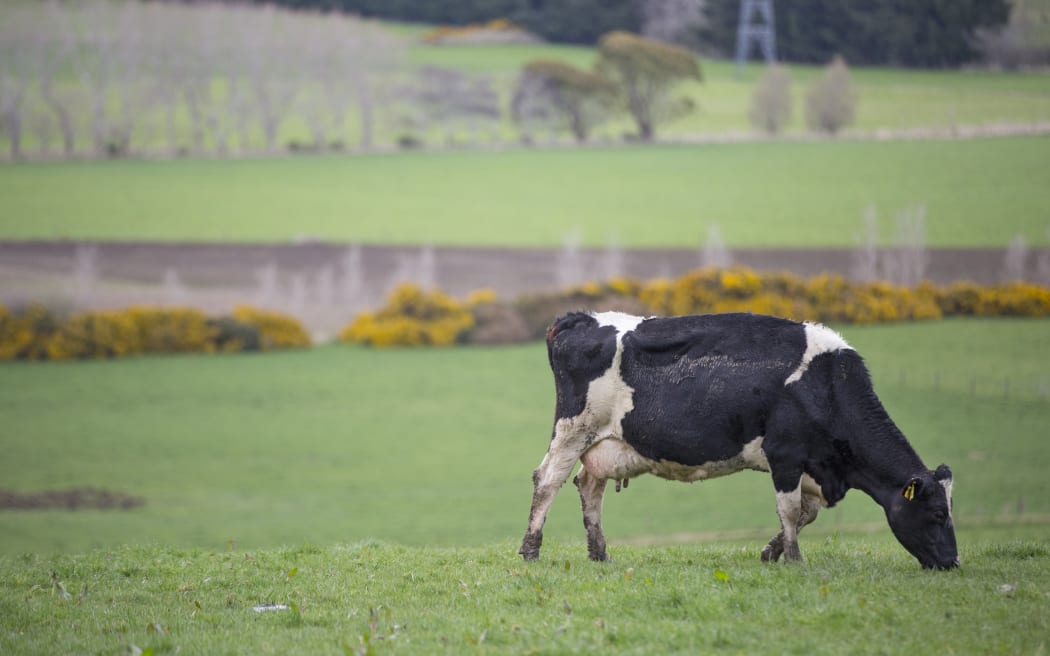
Photo: RNZ / Rebekah Parsons-King
Labour: $100m investment in agritech (see Economy and tax section).
National: Remove two farming regulations for every new one introduced, set up a rural regulation review panel, require costs of new rules on farmers to be assessed, double the RSE worker cap, ban foreign forestry conversions, allow normal rural activity on highly productive land, improve stock exclusion rules (policy here). End resource consents for farmland water storage ponds except in SNAs and wetlands, give councils a two-year deadline for other water storage consents which extend to 30 years, make commercial-grown fruit and vegetables a permitted activity under RMA (policy here).
ACT: Remove all commercial forestry subsidies. Shift responsibility for farm plans from government to councils, require the National Animal Welfare Advisory Committee to include "people with practical animal handling and farming experience", bring back live animal exports, scrap He Waka Eke Noa, replace the Accredited Employer Work Visa with demand-based pricing (policy here).
Green: Develop a climate-resilient national food strategy, support/develop indigenous agricultural practices, significantly reduce livestock numbers and land used for livestock, phase out synthetic nitrogen fertilisers, phase out PKE and other imported animal feed, add soil carbon into climate change frameworks, assist transition to regenerative farming (policy here). Phase out factory-farming including feedlots, limit journey lengths for live animal transport, ensure SPCA is adequately resourced, require non-animal experimentation where available (policy here). Fund new forests including active management of public land, protect Te Tiriti rights over indigenous forests and IP rights over customary use, amend the ETS to prevent overreliance on forestry, require forestry operators to compensate for slash damage, scale up local wood processing, ban imports from illegally logged forests (policy here).
Te Pāti Māori: NYA
NZ First: Replace Te Mana o Te Wai in planning legislation with the "four wellbeing" provisions, have Farm Environment Plans be administered by regional councils and targeted at catchment level, cut irrigation, water storage, managed aquifer recharge and flood protection scheme regulations, put property rights into the NZ Bill of Rights Act and require full commercial compensation when any right is affected or taken, exclude plantation forestry on LUC class 1, 2 and 3 land and limit LUC class four to 25% forestry, require harvesters to contain and remove post-harvest slash via the NES-PF, amend the ETS to recognise farm forestry and shelter belts, manufacturers tax rate of 20%, amend Overseas Investment Act to prevent foreign investment for farm forestry conversion on productive land, enhance animal pest and biosecurity investment through e.g. Jobs for Nature, establish Regional Investment Fund, review Crown Research Institute model to ensure NZ scientists have an advantage over peers in practical farm extension, massively increase funding to the NZ Export Credit Office, provide support to IP protection of NZ regions and varieties, prioritise free trade with India as first part of a Commonwealth FTA, require government procurement to specify natural fibres over those made from oil, provide legal support to use of natural fibres in industry (automotive to aviation), support live animal exports by air and sea with stringent animal welfare protections, require National Animal Welfare Advisory Committee to have 50% farmer representation, remove Landcorp SOE and create it as a Crown Entity for sharefarming, sharecropping and sharemilking under NZ First Farms, require Landcorp crown entity to work with CRIs and tertiary educators, return to the RMA temporarily before replacing it with a Town and Country Planning Act modelled on Irish legislation, re-establish catchment boards focused on active management of rivers and streams and flood protection, refocus the economy on added value and developed products.
Welfare, family, youth and seniors

Photo: 123rf
Labour: No change to superannuation age. Four weeks paid parental leave for partners (policy here). Meet NZ's target of getting 80,000 kids out of poverty by 2028. Reform surrogacy laws so rainbow couples are treated on an equal basis, bring in a rainbow refugee category, expand access to HIV prevention drug PrEP, review the curriculum on relationships and sexuality.
National: FamilyBoost, a $75 a week childcare tax rebate (policy here). Contract not-for-profit job coaching providers for jobseekers aged under 25, plus barrier assessments and job plans and $1000 payments for beneficiaries who stay in work for at least a year (policy here). Introduce a "traffic light" system for Jobseeker beneficiaries, reducing their benefit or requiring mandatory community work if they fail to meet obligations more than twice and indexing benefit increases to inflation rather than wages (policy here). Meet NZ's target of getting 80,000 kids out of poverty by 2028.
ACT: Impose electronic income management on Sole Parent Support beneficiaries for parents with multiple eligible children, Jobseeker Support (Work-Ready) beneficiaries after 17 weeks, repeat hardship assistance applicants, ex-convicts, those with benefit-fraud convictions, and those with substance or alcohol abuse problems (policy here). Create an independent children's watchdog alongside Oranga Tamariki (OT), redevelop social worker roles, increase OT executive accountability (policy here). Make changes to incentivise more drug addicts and sickness beneficiaries rejoin the workforce by requiring MSD case managers to consider if all treatment options pursued before accepting a condition as permanent, expanding roles of regional health advisors and 'designated doctors' to detect benefit fraud, enabling doctors to complete work capacity certificates privately, systematically working to ensure drug-addicted people on a benefit are incentivised to become independent (policy here). Bring back over-the-counter pseudoephedrine and require post-implementation evaluations of prescription-only classifications for common ailments, reform the Retirement Commission and enable widespread individualised funding of in-home care (policy here). End government contributions to Superannuation fund, gradually raise the retirement age to 67 by increasing the age by three months each year. (See also scrapped policies under economy and tax).
Green: Co-design a child wellbeing strategy with Māori, align law and policy with UN rights of the child declaration, support by-Māori, for-Māori solutions that let children stay with whānau, require government policies to be analysed for children's interest, re-establish Children's Commissioner as an independent monitor, ensure all children's free access to mental health services (policy here). Continue Te Aorerekura, prioritise kaupapa Māori solutions to violence, amend the definition of consent in the Crimes Act, provide education on healthy relationships, reform the Family Court and justice system to not retraumatise victims, invest in prevention, recovery and restoration services (policy here). Increase paid parental leave to 15 months, double Best Start payment to $140 a week and make it universal to under-3s (policy here). Keep NZ Super at 65+ with $16 a week more, review Retirement Villages Act, require retirement homes to keep 25 percent of housing available for affordable rental units for seniors (policy here).
Te Pāti Māori: $25 minimum wage with annual increases aligned with cost of living, pay equity for Māori nurses and teachers, double baseline benefit levels, individualise benefits, remove financial penalties and work tests, cancel income support (policy here). End state care of mokopuna Māori, reform OT and set up independent Mokopuna Māori Authority with $1b of funding from OT, establish partnership network for hapū and iwi-based care approaches (policy here).
NZ First: No change to superannuation age, "get people who have spent years on the dole back to work", directly fund aged residential care, ensure "no men are in women's spaces or sports". Set a two-year lifetime limit to the amount of time people can be on a Jobseeker benefit. Keep superannuation entitlement at 65 years with current 66% of net average wage maintained (not shifted in line with inflation), offer a 50% rebate ($1600 maximum) on rates for Super Gold Card holders ($480m approx cost), fund two free doctors' visits including annual eye test for Super Gold Card users, retain Winter Energy Payment, develop a Seniors Housing Plan, boost KiwiSaver by evaluating Singaporean model where New Zealanders can apply KiwiSaver to downsizing their mortgage if savings above a certain level, immediately fund 2000 new standard residential care beds before next election, index residential bed care support to inflation, begin Select Committee inquiry into aged care, secure bipartisan agreement to fully fund care and dementia needs out to 2040, select committee inquiry into fully funded aged care, allow people to use KiwiSaver to clear the mortgage on their family home, ensure KiwiSaver default providers again able to invest in fossil fuels and weapons (if not illegal) and ensure NZ Super Fund can do the same, make Kiwisaver compulsory from age 18 and after entering work, reintroduce the Kiwisaver kickstart with auto-enrolment at birth, offer annual government contribution to match savings up to $250 for under-18s, review KiwiSaver fees and increase government contributions to $1540 (currently $521.43).
Māori and Pacific
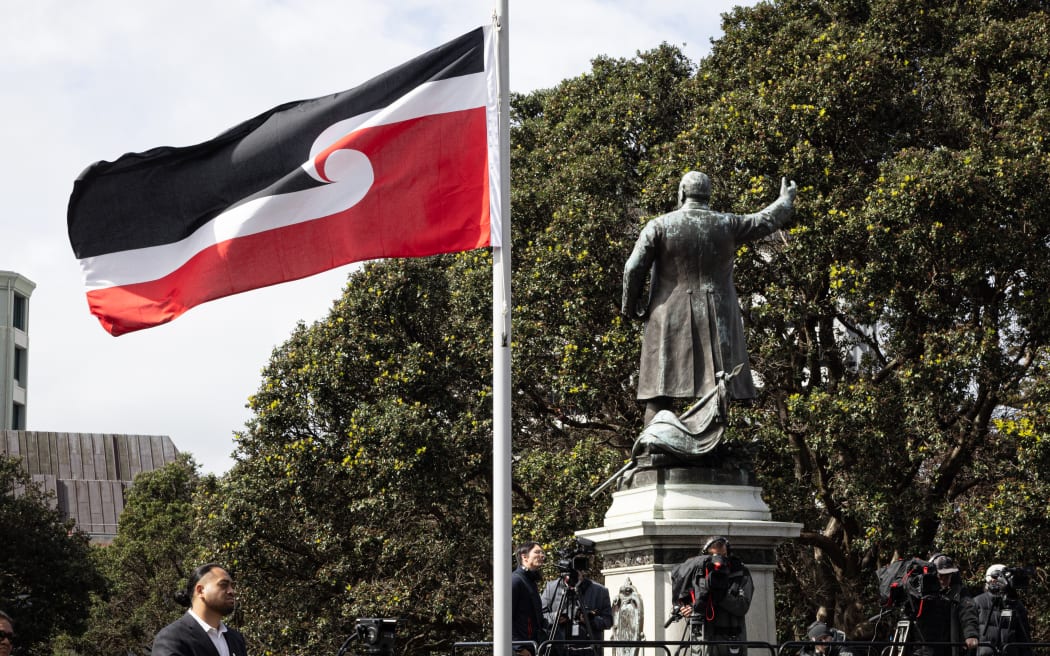
Photo: Phil Smith
Labour: Protect Te Aka Whai Ora (Māori Health Authority), continue Whai Kāinga Whai Oranga Māori housing rollout, continue Te Ahu o te Reo Māori teaching about te reo Māori and the Māori worldview in schools, continue funding Te Matatini and Matariki events, develop a biodiversity credits system (policy here).
National: NYA
ACT: Set specific "principles of the Treaty" (disputed) down in law, repeal local government representation and Pae Ora bills (policy here). Abolish Māori wards in local councils (policy here).
Green: Return ancestral land to hapū through right of first refusal and repeal the 2008 Treaty claims deadline, put an end to perpetual leases on Māori whenua, give Waitangi Tribunal recommendation powers for private land and binding recommendations for Crown land (policy here). Increase funding for Whānau Ora, marae as community hubs including civil defence, marae-based and Māori education initiatives, and Māori initiatives to tackle SUDI (policy here). Repeal Western Samoa citizenship law, replace RSE scheme providing for open work rights and fair wages, support West Papua independence.
Te Pāti Māori: Change New Zealand place name to Aotearoa, replace all Pākehā place names with Māori original ingoa by 2026, set up a $50m Māori Standards Authority for cultural competency standards (policy here). $19m for Te Matatini, $10m for community, hapū and iwi development of kapa haka and related art forms, set up a $57m Toi Māori (arts) commissioning and protection entity (policy here).
NZ First: Change all government department names to English, withdraw from the UN Declaration on the Rights of Indigenous Peoples, introduce legislation to make English an official language.
Science, technology, arts and racing

Photo: AFP
Labour: NYA
National: End the strict regulations on genetic engineering and modification and set up a dedicated regulator to streamline approvals (policy here). Appoint a Minister of Technology, investigate tax changes to help startups attract and retain staff, bring in new tech visas including International Graduates Visa for graduates of world's top 100 universities to live and work for three years capped at 500 people in its first year, new Global Growth Tech visa offering residence for people who have worked at a top global tech company earning $400k+ a year capped at 250 people in its first year, new Digital Nomad Visa offering one year living and work rights and option for work or residence visa application if they stay capped at 250 in first year (policy here). A minister for space, a prime minister's space prize for school students, and two new sites for aerospace and space testing, improve satellite data procurement and sharing.
ACT: NYA
Green: Living wage for artists, expand paid artist residencies, review arts and culture funding, protect traditional and contemporary Māori art, develop arts education strategy. Switch from gambling funding of arts to inflation-indexed investment. (policy here). Support mātauranga Māori as part of the public science system by working with local Māori on retaining IP rights, change the Crown Research Institute/universities model of research to one focused on the public good, ensure publicly funded research is held in the public domain, fund Māori genomic research (policy here).
Te Pāti Māori: Honour WAI262, reject commercialisation of indigenous plants without whānau/hapū/iwi consent, support Māori kai licensing and trademarks, develop a Māori Seed Conservation Strategy, oppose introduction of GE food, establish Māori kai sovereignty board, set up $15m a year contestable community kai fund, work with councils to set aside land for urban/rural food farms, set up Crown-funded kai sovereignty scholarships (food science, marine biology, primary industry), invest $100m into Mātai Ahuwhenua agricultural innovation fund, fund regenerative and organic farming training, secure land and funding for Māori collective supermarket chains, protect right of whānau to sell kai on roadsides without interference or tax (policy here). $10m fund for building an evidence base on the link between Toi Māori and oranga Māori.
NZ First: Encourage Callaghan Innovation, CRIs and Universities to set up regional centres of excellence and business incubators, review Callaghan Innovation grants for its effectiveness with furthering New Zealand's core competitive advantages and post-Ukraine, energy needs, fund local internet service providers to fill remote area internet gaps, develop horse racing exports and promote racing expertise and knowledge at a government level, cut racing industry's administrative costs to owners, work towards racing prize money on par with New South Wales, properly market the racing industry to attract younger participants, set a sustainable growth plan for the racing industry, mitigate gambling harm and ensure health and safety of racing stock.
Governance and media
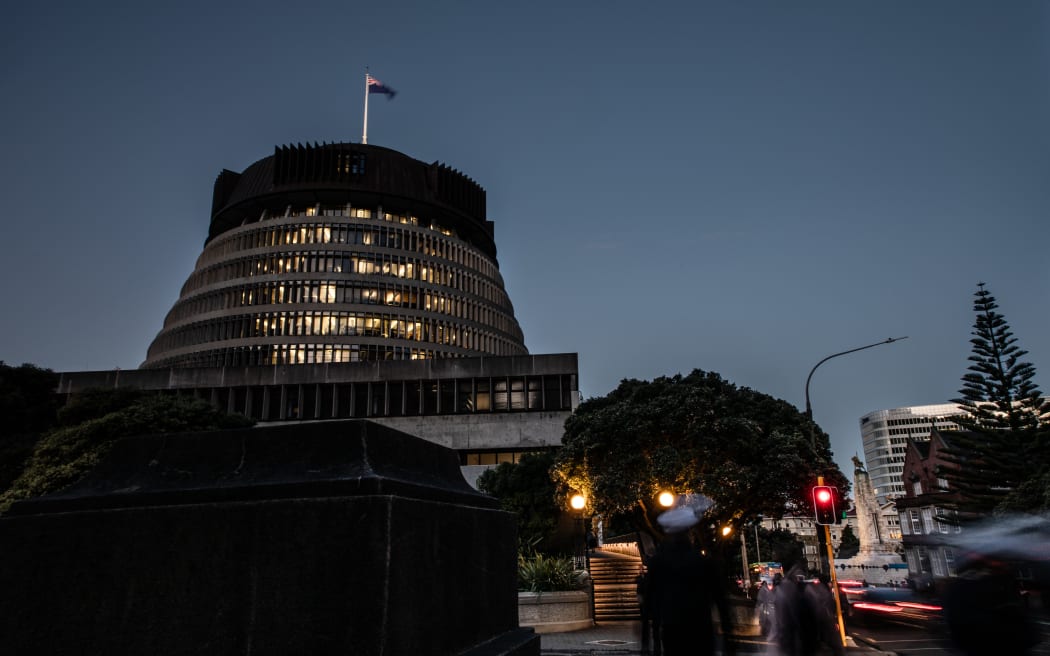
Photo: RNZ / Cole Eastham-Farrelly
Labour: Achieve promised public sector cuts "without significantly reducing the number of people that are in work".
National: Allow KiwiSaver to be split between multiple providers, reverse CCCFA and CoFI lending regulations (policy here). Suite of actions in first 100 days.
ACT: Create a minister and ministry of regulation to evaluate and provide cost-benefit analysis of all new regulation, carry out an inquiry into all current regulations (policy here). Implement a four-year Parliamentary term, independent select committees, set up regulatory standards law (policy here). Aim to halve MBIE workforce and cut programmes to save $1b on day one (policy here). Require annual treasury reports for each department against minister-set KPIs, re-introduce performance-based bonuses for chief executives (policy here). Scrap government's KiwiSaver contributions, film subsidies, Winter Energy payments, Best Start payments, and the first year fees free scheme, (policy here).
Green: Voting age 16, voting rights for prisoners, entrench Māori seats, implement He Puapua recommendations for forming a written constitution, ensure constitutional arrangements uphold Te Tiriti articles, switch to preferential voting in MMP, review campaign finance rules, require agencies to respond promptly to OIA requests and narrow exclusions, improve transparency for lobbying, require civics education in schools, explore four-year term, political donations and campaign funding restrictions (policy here). Set up Ministry for Rainbow communities (policy here). Combine the Advertising Standards Authority, Broadcasting Standards Authority and Press Council, secure long-term funding for Māori TV and iwi radio. Increased funding for non-commercial public media (policy here).
Te Pāti Māori: Commit all Māori to Māori roll, entrench all Māori seats, establish a Māori Parliament, implement all Matike Mai recommendations, insert relativity clauses into all Treaty settlements to ensure parity with Ngāi Tahu and Waikato Tainui, abolish "full and final" and "large natural groupings" approaches to settlements, return conservation land to Māori with right of first refusal, establish Parliamentary Commissioner for Te Tiriti o Waitangi (policy here).
NZ First: Commission an independent one-year inquiry including local and international experts into the Covid response, hold a referendum on an immediate start to a four-year Parliamentary term. No MP pay rises until essential workers get one. Back Mayor Wayne Brown's 'Manifesto for Auckland'. Make it so all "conscience issue" legislation automatically goes to a binding nationwide referendum to be voted on during the general election, require social impact to be assessed as part of policy cost-benefit analysis, restrict sale or use of local and central government assets if not in the national interest, Royal commission of inquiry into media independence, establish a media ombudsman to replace Broadcasting Standards Authority, Public Media Act to replace Broadcasting, Radiocommunications and Māori Television Services Acts, require global tech platforms like Google and Meta to pay for NZ-published content, mandate that TVNZ and other Crown media entities including Māori media work together for more efficicient technology and content provision while ensuring plurality is maintained, require RNZ to support the health of the sector by providing shared services, facilities, content, training and staff development, technical services and infrastructure for publicly funded radio including iwi and community radio, support regional community newspaper and radio newsrooms and enable them to link together, simplify competition rules for media merger activities, futureproof RNZ Concert, and funding for iwi radio, open up frequenceies for Access and Community radio, subsidise half the funding for two-year internships in the news media sector, support Local Democracy Reporting and Te Rito industry development programmes, require journalism and media training organisations to "show how they are giving life to providing a diverse talent pipeline", set up a regional infrastructure fund, "defund any public participation in the World Economic Forum and related bodies".
Immigration, labour and tourism

Photo: 123RF
Labour: 10-year multiple-entry visas for migrants' parents and grandparents for successive visits up to five years requring a financial guarantee from sponsoring children/grandchildren, health insurance and meet good character requirements, a one-off amnesty visa for overstayers who have been in New Zealand for at least 10 years (policy here).
National: Five-year multiple entry visa for migrants' parents and grandparents with option to renew for further five years, requires health insurance, no eligibility for benefits (policy here). A new 80km Great Walk in Canterbury, 120 e-bike chargers for NZ Cycle Trails, broaden DOC tourism concessions, change working holiday visas including removing median wage requirement, establish a $5m contestable tourism fund, direct National Infrastructure Agency to increase funding for areas with high visitors but low ratepayer bases (policy here). Expand international student work rights (see education).
ACT: Five-year visa for family members of migrants, must be renewed every year with a $3500 fee ringfenced for health, requirements for financial sponsorship, basic standard of health, good character and no eligibility for benefits (policy here). Require all Employment Relations Authority decisions to be delivered within a month or ERA members will be fired, remove remedies for at-fault employees, remove ability for ERA to reinstate employees (policy here). Make independent contractors agree to not have full employee rights (policy here). Reintroduce 90-day trials; remove a public holiday; remove 'work to residence' category of immigration green list; remove labour market, wage and replace the Accredited Employer Work Visa with demand-based pricing (policy here). Replace temporary work visas with demand-based pricing, rework the Skilled Migrant Category, remove the cap on Parent Resident Visas but with no eligibility for free healthcare for 20 years, an inquiry into visa processing times (policy here).
Green: Provide residency pathways for all working visa migrants, repeal immigration health requirements, unlink work visas from specific employer, a Pacific passport to allow free travel between Pacific Islands including NZ, restore partner work rights, remove income requirements for parent visas, increase refugee quota to 5000 by 2026, implement Casey report recommendations on asylum seeker detention (policy here).
Te Pāti Māori: An earlier policy to curb immigration until housing meets demand has been removed, with the party apologising to migrants and refugees.
NZ First: Replace the Accredited Employer Worker Visa with Skills Shortage and Labour Shortage visas, develop a 30-year Population Plan to account for population growth, immigration, death and emigration, keep parent category visa cap at 1000, new rural visa scheme with migrants required to stay within a specified community of less than 100,000 residents, re-establish Careers NZ and widen its scope to cover all ages.
Defence and foreign affairs

Photo: RNZ / Samuel Rillstone
Labour: Never bring in drones that can kill people under his leadership. Make it so the Remuneration Authority independently sets Defence Force pay rates rather than the government, and review the Defence Act (policy here).
National: Make free trade with India a "major strategic priority", target a doubling of export value within 10 years, aggressively pursue quality free trade agreements with Gulf countries (note this is a continuation of government attempts), the Pacific Alliance and an economic agreement with UAE, reduce barriers to trade, conduct a record number of trade missions, support strengthening the World Trade Organisation (policy here). Never bring in drones that can kill people under his leadership.
ACT: Increase defence funding to 2 percent of GDP.
Green: Ensure NZDF's roles promote and protect peace, justice and the environment, policing the exclusive economic zone, humanitarian aid, civil defence, and maritime border protection. Develop a centre for training international peacekeepers. Strengthen civil defence to assist NZDF in climate-induced events. (policy here). Oppose NZ joining AUKUS, open international treaties and trade deals to public scrutiny, complete the Agreement on Climate Change, Trade and Sustainability deal, recognise Palestine as a state (policy here). NZ citizenship eligibility for all Māori, longer student loan repayment holiday and end border arrests for non-payment, remove citizens' return requirement for voting and extend permanent residents' period to 10 years, restore 10-years-in-NZ superannuation eligibility.
Te Pāti Māori: NYA
NZ First: Defence Spending of 2% of GDP by 2030, a permanent ring-fenced Defence Capital Fund to pay for defence "capability and estate procurement", instruct uniformed staff to deliver a Defence Command Paper outlining NZ's defence needs, establish NZ Border protection force by merging NZDF, NZ Customs and Immigration NZ, fundamental review of military medals and honours, support recommendations of the independent review of the Veterans Support Act 2014, investigate establishing a Veterans Day.
Notes: Policies have largely been grouped according to parties' approaches. Some Labour policies are government policies which are not taking effect until the next term of Parliament. Parties are listed with the incumbent Labour first, and other parties in order of polling at time of writing. Minor parties are limited to those with a decent prospect of entering Parliament through party vote or a specific electorate. The Opportunities Party (TOP) has been removed after polling revealed leader Raf Manji was unlikely to win the Ilam seat.


